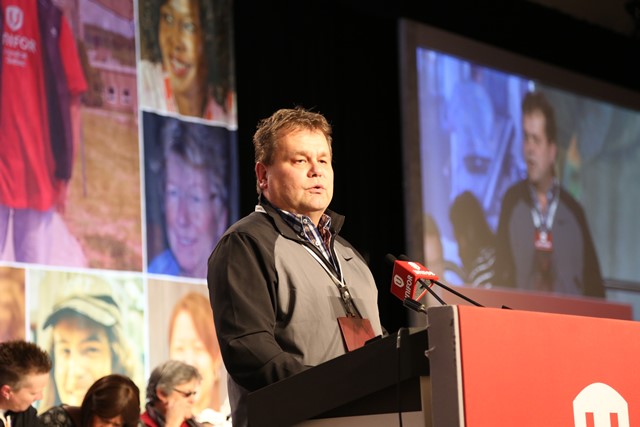By Andy Savela
In Ontario, personal support workers (PSWs) have only six minutes to prepare long term care residents for breakfast, including getting washed, dressed and using the washroom.
You may wonder how it’s possible for an elderly person to get ready so quickly in the morning. The simple answer is that it isn’t.
Unifor is Canada’s largest private sector union, and we represent more than 315,000 members across the country working in every major sector of the Canadian economy, including approximately 29,000 in health care.
In early December 2017, Unifor launched an initiative called the six minute challenge, asking Ontarians to attempt to do what PSWs and long term care residents do every day – get ready in the morning in six minutes and post their photos to social media, using #6minchallenge.
After taking the challenge, participants are urged to contact their MPP to ask for their elected representative to support the call for four hours of direct, daily care for every long term care residents. While the results of participants of the challenge have been amusing in some cases – they point to a very serious problem.
Long term care residents are not getting the kind of care they deserve. Similarly, personal support workers are faced with the impossible task of trying to deliver quality care in a dignified and humane way, while working in an assembly-line like environment. In Ontario no minimum standards of care exist for the sector, which means that residents are not guaranteed a certain number of hours of direct care per day, regardless of the needs or seriousness of their circumstances.
We asked some of Unifor’s health care members in long term care about the challenges they face at work, here is what two of them said:
“Our residents need four hours of direct care per day so that they can have quality of care with dignity. We are working so hard on a daily basis to give quality care to our residents but it is extremely difficult when you have 13 plus residents to care for. Our residents desperately need more front line workers.”
– Kelly, Sault Ste. Marie, PSW for 30 years
“No one deserves to die alone. Imagine dying, with no family to comfort you but the PSW taking care of you. Now imagine dying alone because there is not enough staff to spare the time. We need a minimum of four hours of direct care because our residents need us.”
– Beckie, Thunder Bay, PSW for 16 years
This problem didn’t happen overnight. It has been worsening over the last two decades with chronic underfunding and short-staffing in long term care homes. For the last 15 years, our union, joined by other unions, front-line staff members, families and residents, have been calling on the government to establish a minimum standard of care for the sector. Specifically, we are calling on the government to require a daily average of four hours of direct care for all long term care residents.
In November 2017, we were pleased to see the Ontario government unveil Aging with Confidence: Ontario’s Action Plan for Seniors, which included a commitment to a minimum standard of care. While it’s an excellent start and signals a recognition of the crisis within the long term care sector – it falls short of meeting the needs of residents.
For example, a short fall in the plan is that although it calls for four hours of care for each resident, included in these calculations is administrative overhead, vacation and sick time and other staffing costs. This amounts to millions of misrepresented hours of time, which are not at all going towards direct care for residents. Staffing levels also need to be measurable and enforceable, right across the sector.
What is a nice idea on paper often falls away when faced with reality. This is why Unifor is renewing its call on the government to make sure that the rules are in place and regularly enforced so that all long term care homes comply.
Do you wonder if you could get ready in the morning in six minutes? Try and find out. First, watch this short video at www.unifor.org/6minchallenge and then share your results on social media using the hashtag 6minchallenge. Together, we can make a meaningful difference for long term care residents, but we all must raise our voices in support of four hours of direct care, for every resident, every day.
Andy Savel is Health Care Director, Unifor.




